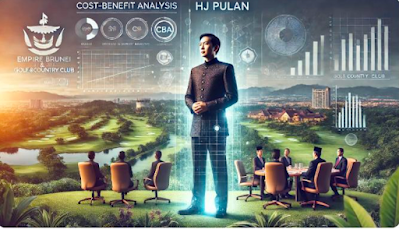By DMAO
What if lasting success isn't solely defined by profits?
What if true leadership involves looking beyond numbers to embrace a vision centred on sustainability, community, and ethics?
This narrative illustrates a transformative journey—one that reimagines how a world-class destination can thrive amidst modern challenges.
Although the Empire Brunei Golf Club is fictional, this case study offers insightful perspectives on the power of bold leadership and innovative strategies.
The characters and events may be imagined, yet they embody real lessons with universal resonance.
At the core of this tale is Haji Awang Pulan, a visionary who redefined success by merging conventional financial metrics with a dedication to sustainability, ethical decision-making, and community engagement.
This case study serves as a creative exploration aimed at inspiring leaders, managers, and readers from all backgrounds.
By delving into Haji Pulan’s transformative journey, we can discover practical insights and strategies relevant to both real-world contexts and this imaginative scenario.
Join us as we navigate this narrative and uncover principles that can foster a better, more sustainable future.
A Vision for Change
The Empire Brunei Golf Club found itself at a crossroads. Rising maintenance costs, environmental concerns, and declining member satisfaction jeopardised its status as a premier golfing destination.
For decades, the club relied on traditional metrics like Return on Investment (ROI) to guide decision-making, but these numbers alone were insufficient to maintain its world-class reputation.
Enter Haji Awang Pulan, a seasoned manager with over a decade of service at the club.
After being promoted to General Manager, he quickly recognised the limitations of focusing solely on ROI.
“We needed a new approach,” Haji Pulan explained. “One that valued people, the planet, and profits equally.”
Drawing from his extensive experience, he introduced a transformative framework: a combination of Cost-Benefit Analysis (CBA) and Corporate Social Responsibility (CSR).
This shift wasn’t merely about calculating financial indicators; it aimed at redefining success.
Under Haji Pulan’s leadership, the club embarked on a new era characterised by innovation and community collaboration.
Building for the Future
One of Haji Pulan’s initial major projects was a comprehensive restoration of the club’s greens, bunkers, fairways, drainage, and irrigation systems.
Guided by Cost-Benefit Analysis, the project assessed not only immediate costs but also long-term benefits. The outcomes were impressive:
Improved Playability: Renovated greens and fairways significantly enhanced the playing experience, attracting high-paying clientele and increasing member satisfaction.
Environmental Sustainability: Upgraded irrigation and drainage systems reduced water usage and minimised the club’s environmental impact. Native vegetation was introduced to boost biodiversity.
Enhanced Reputation: The club’s commitment to sustainability gained media attention and attracted environmentally conscious sponsors and golfers.
Long-Term Financial Gains: Though the initial investment was considerable, the long-term benefits included reduced maintenance costs, increased memberships, and higher revenue from events and corporate partnerships.
Community at the Core
Haji Pulan understood that success encompassed more than financial metrics—it was fundamentally about people.
He actively engaged club members and staff in the decision-making process through workshops, forums, and feedback sessions, fostering a sense of ownership and pride among all stakeholders.
Long-time member Mokhtar praised Awang Pulan’s leadership: “I’ve been playing here for 15 years, and I’ve never seen the course in better shape. Awang Pulan’s vision has truly brought it back to life and made us all proud to be part of this transformation.”
Staff members proposed practical ideas for reducing resource usage, such as switching to organic fertilisers and minimising chemical treatments.
Members organised cleanup drives and suggested green initiatives, transforming sustainability from a top-down directive into a collective commitment.
Incorporating Faith, HSE, and HRD
Haji Pulan’s leadership extended beyond sustainability—it was deeply rooted in ethical principles inspired by Maqasid Shariah, complemented by a commitment to Health, Safety, and Environment (HSE), as well as Human Resource Development (HRD).
This approach infused the club’s strategy with a spiritual and ethical dimension, emphasising a holistic vision of growth. The applied principles of Maqasid Shariah included:
Preserving Life (Hifdh An-Nafs): Integrating robust HSE measures to ensure the safety and well-being of staff and members.
Preserving Wealth (Hifdh Al-Mal): Ensuring responsible resource management through careful planning and Cost-Benefit Analysis (CBA).
Protecting the Environment (Maslahah): Implementing sustainable upgrades, such as efficient irrigation systems and native vegetation, reflecting stewardship of natural resources.
Promoting Community Welfare and Intellectual Growth (Hifdh Al-Nafs and Hifdh Al-'Aql): Fostering pride and ownership among stakeholders through inclusive engagement and education, emphasising continuous skills training and staff development as part of HRD.
Upholding Ethical Leadership (Hifdh Ad-Din): Aligning all strategies with Maqasid Shariah principles to ensure long-term “barakah” (blessings) for both the organisation and the broader community.
This holistic approach not only ushered in long-term success but also radiated “barakah” across all facets of the club’s operations.
His Majesty’s Vision and Titah
Haji Pulan’s implementation of Maqasid Shariah and sustainability principles resonated with the vision articulated by His Majesty the Sultan of Brunei Darussalam in his titah (royal address).
His Majesty frequently emphasises the importance of ethical governance and sustainability guided by Maqasid Shariah. Key themes from His Majesty’s titah include:
Prioritising Public :Welfare: Islamic law and policies should prioritise the well-being and safety of the people.
Adherence to Halal Standards: Ensuring compliance with halal practices reflects ethical responsibility.
Balancing Tradition with Modern Needs: Maqasid Shariah principles must evolve to address contemporary challenges.
Promoting Sustainability: His Majesty stressed the significance of aligning policies with environmental stewardship to ensure long-term prosperity.
Haji Pulan’s leadership embodied these values, demonstrating how faith-based ethics, HSE practices, and HRD initiatives could complement modern business strategies to stimulate innovation and sustainable growth.
A Legacy of Excellence
Under Haji Pulan’s guidance, The Empire Brunei Golf Club evolved into more than just a golf course—it became a symbol of sustainability, community, and innovation.
The club’s success story garnered widespread attention, inspiring other organisations to reconsider their strategies. “Haji Pulan’s story reminds us that leadership isn’t about quick wins—it’s about creating a future worth celebrating,” observed one industry analyst.
His legacy affirmed that investments in quality and sustainability yield returns that extend beyond financial profits, creating a lasting impact on society, the environment, and future generations.
Key Takeaways
Think Beyond Profits: True success extends beyond immediate returns; consider the broader implications of your decisions for people and the planet.
Engage Your Team and Community: Collaboration and inclusivity foster innovative solutions and strengthen commitments.
Lead with Purpose: Align decisions with values and ethical principles to build a legacy of excellence.
This fictional story attests to the potency of bold, visionary leadership.
It prompts us to reflect: What legacy will we leave behind?
How can we redefine success within our organisations and communities?
The answers may well lie on the fairways of The Empire Brunei Golf Club.









.jpeg)
No comments:
Post a Comment